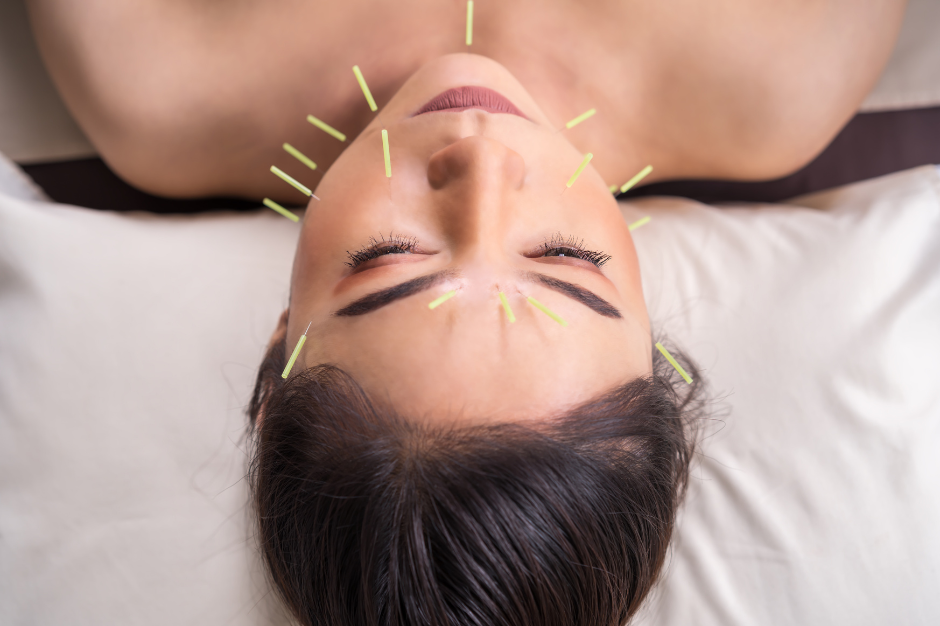
Cosmetic acupuncture is a subset of traditional acupuncture. Like traditional acupuncture, cosmetic acupuncture seeks to improve your well-being. However, in cosmetic acupuncture, the practitioner also focuses on improving the appearance (and youthfulness!) of your face. Acupuncture is often not the first option you consider for anti-aging, but maybe it should be!
Acupuncture is perfect for people seeking a natural alternative to Botox. Besides being relaxing, effective, and safe, facial acupuncture is also making headlines. Kim Kardashian was spotted using acupuncture to unwind as far back as 2013. More recently, Harpers Bazaar featured cosmetic acupuncture as an alternative to Botox for an increasingly large audience of “notox” seekers. But does cosmetic acupuncture actually work, and how?
How does cosmetic acupuncture prevent aging? The science behind acupuncture and age
Acupuncture is widely used to relieve pain, address inflammation, or recover from injury. At its core, acupuncture works by rebalancing the central nervous system: acupuncture needles puncture skin in specified points and stimulate the flow of qi, or energy. The stimulation elicits a nerve response from your body capable of reducing inflammation or balancing your hormones.
Acupuncture is already considered helpful for various health conditions including pain, anxiety, depression, and fertility. Widely regarded as safe and effective by medical bodies, researchers found acupuncture effective against everything from stroke recovery to tennis elbow. In a two year scientific trial conducted at teaching hospitals in China, acupuncture helped to reduce the occurrence of migraines.
What do these health benefits have in common? Almost all of the studied benefits of acupuncture stem from acupuncture’s ability to manage oxidative stress: a key factor in how we age.
Acupuncture stimulates nerve endings for an anti-inflammatory response
In 2021, neuroscientists at Harvard Medical School were able to identify the mechanism behind acupuncture’s anti-inflammatory response. Using mice, the researchers found a subset of neurons must be present for acupuncture to work. Acupuncture on the mice’s bellies was not effective, for example, but using it on their hindlegs was because of the different nerve fibres there. Based on the distribution of the mouse’ nerve fibres, researchers were able to almost precisely predict where its “acupoints” were. The Harvard scientists’ results give us some clue as to how acupuncture needles no thicker than a strand of hair can lower inflammation and stimulate the release of ‘feel good’ chemicals like endorphins and dopamine.
In 2022, researchers in China administered a randomized controlled trial containing 497 patients recovering from ischemic stroke. The trial found acupuncture to be clinically effective against a control group. Results showed that acupuncture improved both neurological function and blood flow or the patients. According to the study’s authors, acupuncture helped to regulate the patients’ oxidative stress, which is consistent with previous research on the topic.
Acupuncture helps protect cells from age related damage
Why is oxidative stress important as we age? Anyone who has guzzled antioxidant rich pomegranate juice to fend off wrinkles is probably familiar with the concept of oxidative damage. Free radicals are unstable molecules from factors like smoking, pollution, or junk food. Free radicals damage our cells, which can lead to disease, inflammation, or aging. Antioxidants help protect our cells and neutralize some of this damage. We get antioxidants from our diet (via, say, pomegranate juice) or by making these antioxidants ourselves.
This is where acupuncture comes in. The Nrf2-ARE pathway in our body is the “sensor” for free radical damage and tells our antioxidants to respond. The efficiency of this pathway tends to decline with age, making cells more vulnerable to damage. Acupuncture seems to help activate this pathway via stimulating blood flow and reducing inflammatory response.
Acupuncture works to create firmer, more youthful looking skin
Acupuncture practices and Traditional Chinese Medicine (TCM) have emerged in the beauty space thanks to celebrities like Gweneth Paltrow and Kim Kardashian. Another article in Harper’s Baazar saw a beauty reviewer try facial acupuncture after finding out it was behind a friend’s trim jawline and glowing complexion.
The benefits of acupuncture indeed extend to anti-aging, which isn’t surprising when you consider oxidative damage, as well as the “whole body approach” acupuncture takes. The skin is the largest organ in our body. As we age, the collagen and elastin in our skin loses its strength and flexibility. Additional factors, such as UV light, cellular turnover, or hormonal imbalances (think: free radicals) can all contribute to the aging process – as can the movement of our face.
The muscles in our face stretch and contract, just like the muscles in other parts of our body. Nearly every movement we make is muscle contraction – from the blink of our eyelids to the muscles of our cheeks. Practices like acupuncture, which are designed to relax muscles and contribute to a balanced sense of well-being, can be effective in decreasing stress. The effect can lead to less muscle movement, fewer stress lines from wrinkling your forehead or pinching your mouth. That said, cosmetic acupuncture isn’t meant to replicate the results from Botox: just slow the signs of aging and give the client a more youthful glow.
Cosmetic acupuncture can slow the signs of aging – and make you feel better overall
Although studies on the benefit of cosmetic acupuncture are still emerging, we already have some research to back the idea. The clinical and medical research referenced earlier in this article suggest acupuncture can play a role in lowering oxidative stress, a critical factor in how we age. In addition to lowering our oxidative stress, acupuncture can promote feel-good hormones like oxytocin (think: cuddling a pet) and dopamine(checking off an item on your to-do list). The same feel-good feelings can contribute to not “looking our age” – or just plain feeling better as a whole.
